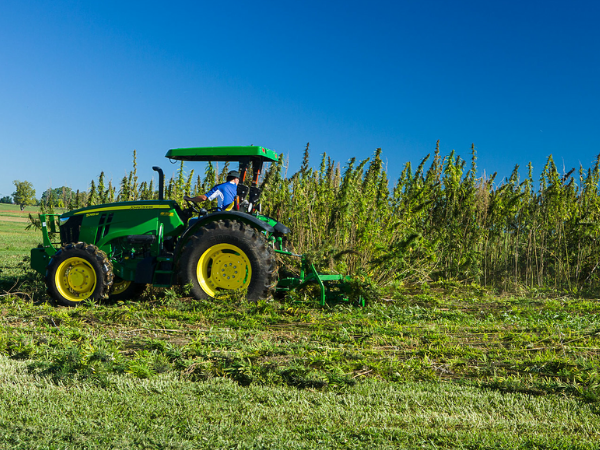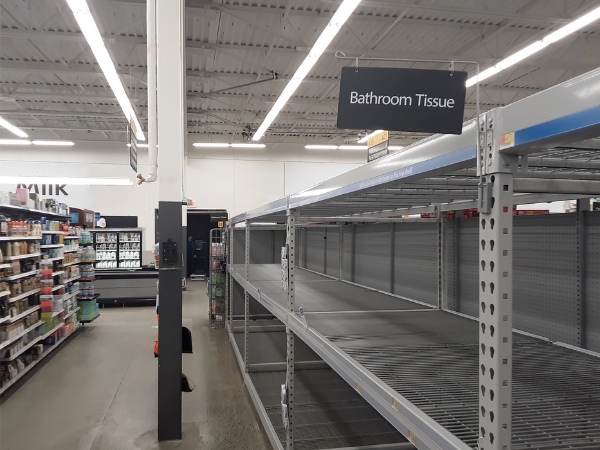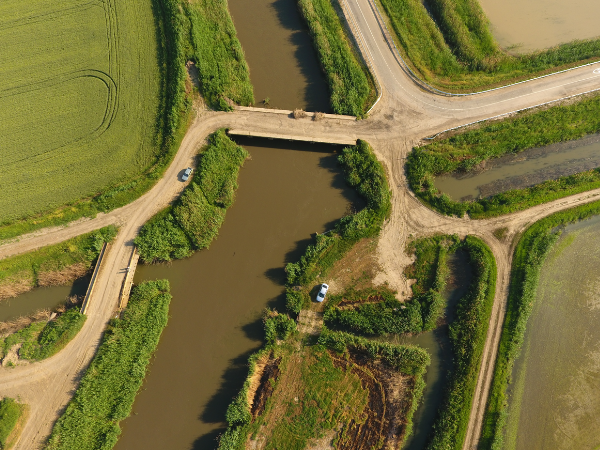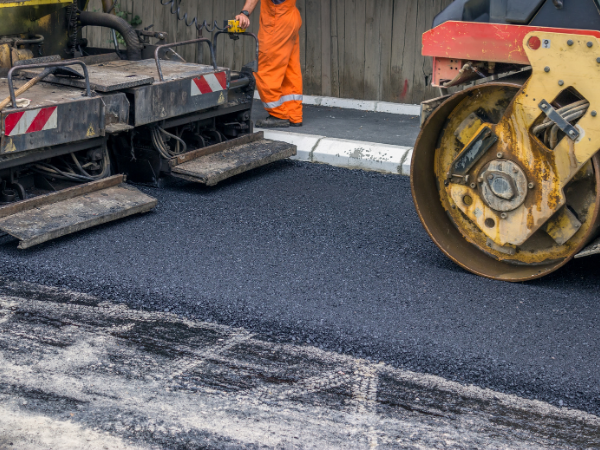Capitol Reflections: 2021 Session Issue 5
“It would be a dangerous delusion were a confidence in the men of our choice to silence our fears for the
safety of our rights... Confidence is everywhere the parent of despotism. Free government is founded in
jealousy, and not in confidence. It is jealousy and not confidence which prescribes limited constitutions,
to bind down those whom we are obliged to trust with power... Our Constitution has accordingly fixed
the limits to which, and no further, our confidence may go... In questions of power, then, let no more be
heard of confidence in man, but bind him down from mischief by the chains of the Constitution.”
-Thomas Jefferson
Industrial Hemp Bill Introduced
 BOISE - On Wednesday, the House Agricultural Affairs Committee voted to introduce legislation that would legalize the production, processing, transportation, and research of industrial hemp in the state. Farm Bureau is the author of H126 and is working with Senator Jim Guthrie (R-McCammon) as the bill’s legislative sponsor.
BOISE - On Wednesday, the House Agricultural Affairs Committee voted to introduce legislation that would legalize the production, processing, transportation, and research of industrial hemp in the state. Farm Bureau is the author of H126 and is working with Senator Jim Guthrie (R-McCammon) as the bill’s legislative sponsor.
Throughout the country, there are 49 states, 2 territories, and 48 tribes that have legalized industrial hemp in some form or fashion. The Idaho Legislature has considered this topic over the past couple of years, and the Farm Bureau is now bringing H126 forward for the legislature’s further consideration.
Farm Bureau has also worked closely with both the Senate and House Ag. Committee Chairman, Senator Van Burtenshaw (R-Terreton) and Representative Clark Kauffman (R-Filer), as well as key stakeholders representing the agriculture industry, trucking industry, law enforcement, state agencies, amongst others to ensure that all concerns and issues were addressed.
An outline of the legislation follows:
Section 1 of the bill adds a new chapter to title 22 (Idaho’s Agriculture Title) defining industrial hemp, directing ISDA to develop a state hemp plan, and authorizing the production, research, processing, and transportation of hemp containing 0.3% or less of tetrahydrocannabinols (THC) in the state according to the provisions of the 2018 Farm Bill.
Section 2 and Section 3 of the bill amends parts of chapter 27, title 37 (Idaho’s Controlled Substances Title and Schedule I Drug List) to define industrial hemp, provide parameters of possession, and removing industrial hemp from Schedule I.
Section 4 of the bill adds a new section to chapter 29, title 67 (Idaho’s Titles regarding State Gov’t/State Police) to provide for the legal transportation and possession of industrial hemp in and through the state.
The bill also provides a severability and emergency clause that would allow the legislation to go into effect upon its passage and approval.
Farm Bureau has had three goals through our work on this proposed legislation. First, to legalize the production of industrial hemp in the state. Second, to maintain a strong and enforceable drug policy. And third, to work to ensure that all stakeholders are comfortable with the proposal that we develop. We do not pretend that everyone will love every aspect of this proposal. Nonetheless, it does represent a certain level of consensus among all stakeholders.
Farm Bureau is the state’s largest general agriculture organization. We have strong policy supporting the production of industrial hemp, and our core beliefs and philosophies support a society free of drug abuse. IFBF supports H126.
Top of the page
Trapping Bait
 BOISE - H91 was up for a vote in the House Resources Committee this week. This bill simplifies code to make the use of bait for trapping fur-bearing and predatory animals uniform. Currently, the use of naturally killed big game as bait is allowed for trapping, but only for wolves. It only makes sense to simplify the rules to include predatory and fur-bearing animals as well. This way there are no disparities between the different classifications of animals. Under the current conditions, if a trapper were to do everything correctly, use natural kill without disturbing the carcass to set a wolf trap, and a coyote stepped into that wolf trap, the trapper is now outside of the law, despite doing everything in his power to follow the rules.
BOISE - H91 was up for a vote in the House Resources Committee this week. This bill simplifies code to make the use of bait for trapping fur-bearing and predatory animals uniform. Currently, the use of naturally killed big game as bait is allowed for trapping, but only for wolves. It only makes sense to simplify the rules to include predatory and fur-bearing animals as well. This way there are no disparities between the different classifications of animals. Under the current conditions, if a trapper were to do everything correctly, use natural kill without disturbing the carcass to set a wolf trap, and a coyote stepped into that wolf trap, the trapper is now outside of the law, despite doing everything in his power to follow the rules.
Simplification of the rule would make it easier for everyone to understand and comply across the board. There should be no issue of using natural kill for bait with a coyote or other animal when it is allowed under code for a wolf. Trappers are a key component when it comes to wolf control in Idaho. Clarification in code allows them to concern themselves more with what they do best, which is trapping, instead of constantly being concerned if they are in compliance with an inconsistent law. This law is for use of wildlife as bait and does not include any natural kill of livestock on the range. The trapper must also be in compliance with salvage laws, as referenced in H91. The bill passed out of committee and is headed to the House floor for a vote. IFBF policy #78 supports H91.
Top of the page
Price Gouging
 BOISE - This week, the Senate approved S1041 which seeks to amend Idaho’s “price gouging” law. The intent of the price gouging law is supposedly to ensure that “unscrupulous” businesses would not “take advantage of consumers” during a declared emergency by significantly raising prices on necessary items including fuel, food, pharmaceuticals or water.
BOISE - This week, the Senate approved S1041 which seeks to amend Idaho’s “price gouging” law. The intent of the price gouging law is supposedly to ensure that “unscrupulous” businesses would not “take advantage of consumers” during a declared emergency by significantly raising prices on necessary items including fuel, food, pharmaceuticals or water.
Although it may sound counter-intuitive, in reality price gouging laws end up harming those they are designed to “protect” by actually causing shortages of needed supplies during times of emergency. Market prices are not just arbitrary numbers that are assigned to products by businesses. They provide valuable information to both suppliers and consumers. Higher prices signal businesses to produce more, or divert additional supplies to the higher priced area, while simultaneously signaling consumers to economize and only purchase what they need, leaving more supplies for others. When government interferes with these important market signals, there are unintended consequences. This was vividly illustrated by empty shelves this past year here in Idaho.
Which scenario would you prefer in an emergency situation? A.) Products that you need are still available, but at dramatically higher prices, which incentivizes people to only purchase the minimum amount they need; or B.) Products you need are not available at any price since the government mandated that prices could not be raised. Under normal pricing, a few people “hoarded” necessary items and everyone else was out of luck.
Most Idahoans had never witnessed empty store shelves before last year since the unhampered market is very effective at providing goods and services that consumers want. However, despite government’s efforts to “protect the consumer” from high prices, all they really did was ensure that most consumers could not get the products they wanted at any price. No matter how hard some may try, you cannot legislate away the laws of supply and demand.
S1041 is a response to the Attorney General’s heavy-handed shake-down of three state-wide fuel retailers. The AG’s office claimed the fuel retailers had violated the state’s price gouging law during the emergency this past year, even though their fuel prices remained stable and gently fell during the emergency. Despite the clear language of the law prohibiting dramatic price increases, the AG’s office claimed the fuel retailer’s margins were too high since their retail fuel prices had not dropped as fast as the wholesale market for fuel. S1041 clarifies that the law applies only to exorbitant or excessive increased prices to the consumer rather than to the margin between wholesale and retail prices.
Without this clarification, can you imagine what it would be like for the Attorney General’s office to investigate your farm and demand all your financial records to determine if you were price gouging by receiving a higher margin on your agricultural produce during a declared emergency? That is just what happened to these fuel retailers. Farm Bureau has no interest in allowing the Attorney General or any other government entity to have that sort of broad authority.
Fortunately, the Senate voted 34-0 to approve S1041. Senator Jim Guthrie (R-McCammon) did a great job of sponsoring this bill, and we appreciate his efforts to ensure government does not increase its ability to interfere in the market. S1041 will now move to the House for consideration in the Commerce & Human Resources Committee. IFBF Supports S1041.
Top of the page
Water Quality Trading Program
 BOISE - Last week, the House Environment, Energy, and Technology Committee introduced a bill (H99) that would grant Idaho DEQ the authority to oversee a voluntary state water quality trading program. Representative John Vander Woude (R-Nampa) is sponsoring the bill that is backed by the Idaho Water Users Association.
BOISE - Last week, the House Environment, Energy, and Technology Committee introduced a bill (H99) that would grant Idaho DEQ the authority to oversee a voluntary state water quality trading program. Representative John Vander Woude (R-Nampa) is sponsoring the bill that is backed by the Idaho Water Users Association.
The proposed legislation is necessary for Idaho to establish a mature nutrient trading program that provides a benefit to the regulated community and Idaho's water resources. H99 authorizes a voluntary water quality innovation and nutrient trading program in the state and provides the DEQ authority to regulate the program.
The interest in, and effort to create such a program has existed in Idaho for many years. The biggest difficulty has been how to establish credit values and who would oversee that process. With more information available regarding nutrient levels and processes that remove them from water, coupled with an increased public interest, it is an appropriate time to establish the proposed voluntary program in the state.
IFBF Policy #31 supports the concept of effluent trading. IFBF supports H99.
Top of the page
One Small Curb on Eminent Domain
 BOISE - Currently in Idaho, urban renewal boards may be elected by the citizens, but are not required to be. Either way, they unfortunately have the power of eminent domain. These boards are typically created by a city council or county commission, each of whom are elected by the people and also have the power of eminent domain.
BOISE - Currently in Idaho, urban renewal boards may be elected by the citizens, but are not required to be. Either way, they unfortunately have the power of eminent domain. These boards are typically created by a city council or county commission, each of whom are elected by the people and also have the power of eminent domain.
S1044 seeks to remove the power of eminent domain from those urban renewal boards that are appointed and not elected. They would be advisory only on such issues, and the final decision would then be made by the elected municipal body. This will result in more direct accountability to the voters.
Farm Bureau members take private property rights very seriously. Secure property rights are the cornerstone of our economy and their protection is guaranteed under both the Idaho and U.S. Constitutions. Therefore, we are always very alert and concerned anytime eminent domain is asserted as this directly deprives citizens of their property rights. Eminent domain would not be used if the landowners were willing sellers.
The power of eminent domain should only be used for very narrowly defined purposes and only as a very last resort. Allowing this power to be used by those who are appointed and have no accountability to voters is very dangerous to the protection of citizen’s rights.
This week Senator Mary Souza (R-Coeur d’Alene) successfully shepherded S1044 through the Senate on a vote of 34-0. Farm Bureau appreciates Senator Souza’s recognition of the sanctity of property rights and the importance of putting meaningful limits on the use of eminent domain. S1044 will now advance to the House where it will be considered by the House Local Government Committee chaired by Rep Ron Mendive (R-Coeur d’Alene). IFBF supports S1044.
Top of the page
Road Materials Sales Tax
 BOISE - H112 was introduced by the House Transportation Committee this week. This proposed legislation deals with the sales tax that is collected on road materials that end up being used in road maintenance, replacement or construction. Right now, sales tax is collected differently on road materials dependent upon who owns the vehicles that are involved in the road maintenance that the materials are being used for. This means that sales tax is not collected on the material if it is ITD or a local Highway District vehicle that is working on the road construction. However, if one of those agencies contract out the work and the contractor buys the material for the road and use their equipment they are subject to paying sales tax, even though the materials are being used specifically for the road project. Because of this, money that was designated for transportation funding is now being used to pay sales tax, which then is deposited into the general fund. This money that was meant for transportation won’t reach the road but instead will get redistributed to another area from the general fund. This is an inefficient use of transportation funding money.
BOISE - H112 was introduced by the House Transportation Committee this week. This proposed legislation deals with the sales tax that is collected on road materials that end up being used in road maintenance, replacement or construction. Right now, sales tax is collected differently on road materials dependent upon who owns the vehicles that are involved in the road maintenance that the materials are being used for. This means that sales tax is not collected on the material if it is ITD or a local Highway District vehicle that is working on the road construction. However, if one of those agencies contract out the work and the contractor buys the material for the road and use their equipment they are subject to paying sales tax, even though the materials are being used specifically for the road project. Because of this, money that was designated for transportation funding is now being used to pay sales tax, which then is deposited into the general fund. This money that was meant for transportation won’t reach the road but instead will get redistributed to another area from the general fund. This is an inefficient use of transportation funding money.
H112 fixes this by providing a mechanism for governmental agencies to receive a rebate for sales tax that is paid on road materials by contractors. The government agency will be required to file a written claim with the state tax commission to receive the rebate. This rebate mechanism ensures that transportation funding money stays in transportation and is not wasted. It also ensures that those monies can be put into road maintenance or construction without losing it to the general fund through a tax. The fiscal note estimates this will give back $12 million to transportation funding that is currently being lost to sales tax and is not able to go into road maintenance. Rep Jason Monks (R- Meridian) and Rep Joe Palmer (R- Meridian) are sponsoring this bill. IFBF Policy #171 supports H112.
Top of the page
Still can't find what you are looking for? Find by topic:
- Achievement Award (YF&R)
- Actions Alerts
- Advocacy
- Ag Ambassadors
- American Farm Bureau
- American Farm Bureau Policy Book
- Archive Photos
- Articles
- Board of Directors
- Calendar - State/District
- Calendar - County
- Capitol Reflections
- Collegiate Chapters
- Committee Application Form
- Commodities
- Convention Annual
- County Presidents & Board Information
- County Resource Page
- Delegate Form
- Discount Programs
- Discussion Meet
- Discussion Meet - High School
- Education Programs
- Events
- Excellence Award (YF&R)
- Expense Voucher
- Flickr
- Gem State Producer
- High School Discussion Meet
- High School Speech Contest
- Hope in Idaho Ag
- House of Delegates Credentials Form
- IFBF Board of Directors
- IFBF Policy Book
- IFBF Staff
- Insurance
- Legislative Action Program
- Legislative Issues
- Library
- MAC Trailer
- Magazines
- Map My Benefits
- Member Benefits
- Member Discount
- Membership Application
- Mission Statement
- Moving Agriculture to the Classroom
- Newsletter Sign up
- News Releases
- News Room
- Open Range Law

